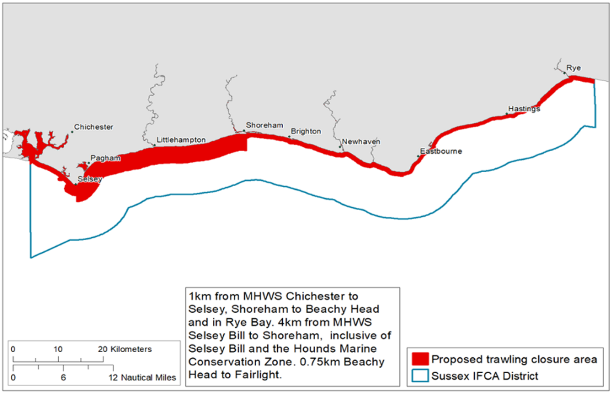Project No. 2145
Primary Supervisor
Dr Mika Peck – University of Sussex
Co-Supervisor(s)
Dr Ian Hendy – University of Portsmouth
Dr Reuben Shipway – University of Portsmouth
Dr Katie Critchlow – Naturemetrics
Summary
Rationale
Before the great storm of 1987[1] kelp forests of West Sussex played similar roles to tropical coral reefs, acting as nurseries for marine fish and invertebrates, sequestering carbon and protecting the coastline from storm damage[2]. The storm event ripped up kelp beds allowing entry by bottom trawlers disturbing the substrate and halting regeneration of once common kelp ecosystems. Recently a multi-partner effort, ‘Help our Kelp’ has supported the Sussex Inshore Fisheries and Conservation Authority’s (IFCA)[3] bylaw[4], due in to force in 2020, restricting trawler activity along the coast (Figure 1). This is an exciting opportunity to regenerate and ‘rewild’ UK coastal water restoring ecosystem structure, function and sustainable inshore fisheries.
However, information is urgently needed on current extent of kelp and status of fisheries to establish a control baseline to monitor changes once the byelaw comes into force. Major gaps in knowledge include;

- Data on status of kelp beds at depths <10m (photic limit of kelp in channel waters) as commercial mapping lacks information.
- Fisheries information (abundance and diversity) – information is difficult to obtain via traditional methods such as netting or onboard observers.
Approach
This DTP brings together expertise in marine biology and emerging fields of sonar habitat mapping, ecoacoustics and environmental DNA (eDNA) to develop novel toolkits for rapid assessment of marine health and monitoring.
Impact
Data generated provides IFCA with key information and emerging technologies for active management of restoration efforts of kelp habitats and inshore fisheries. The tools developed have application globally for fisheries and restoration management with both commercial and regulatory use. Additionally, this research supports climate change mitigation, improve local and region ecosystem services and value boosting ecology, environment and economy.
